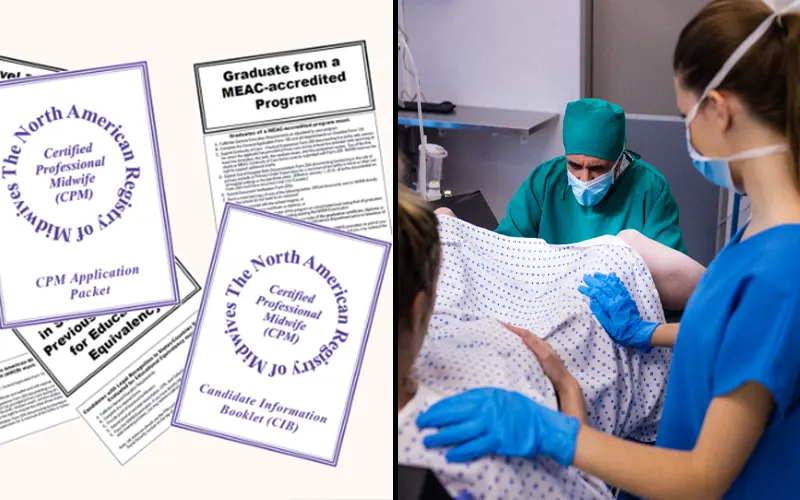You can become a midwife without a nursing degree, and many find this route both focused and fulfilling. Direct-entry midwifery programs offer a specialized path to enter the field without first obtaining a nursing background.
These programs are crafted to equip you with the essential skills needed to support women throughout pregnancy, childbirth, and postpartum care. They blend theoretical knowledge with practical, hands-on training, preparing you for real-world scenarios.

This alternative path provides a direct route into midwifery. This allows you to start your career more quickly. If you’re passionate about making a positive impact on mothers and their babies, exploring direct-entry midwifery could be your ideal career choice. Begin your journey today and take the first step toward a rewarding and impactful profession.
What is a Midwife?
A midwife is a trained professional specializing in the care of pregnant women. They provide essential support throughout pregnancy, childbirth, and the postpartum period. Midwives assist with natural births, managing labor, and ensuring a smooth delivery process.
They offer comprehensive prenatal care. They help to monitor the health of both mother and baby. During labor, midwives provide guidance and support to facilitate a positive birth experience. After childbirth, they help with postpartum care and offer advice on breastfeeding and newborn care.

Midwives work in various settings, including hospitals, birthing centers, and home births. Their focus is on promoting a healthy, safe, and supportive environment for mothers and their babies, aiming to enhance the overall birth experience.
Explore Different Types of Midwives
Midwifery offers various types of professionals. Each with unique qualifications and roles. Understanding these can help you choose the right care for your birth.
| Type of Midwife | Training and Qualifications | Care Setting | Scope of Practice |
| Certified Nurse-Midwives (CNMs) | Registered nurses with advanced midwifery education | Hospitals, birth centers, homes | Comprehensive care including gynecological, prenatal, and delivery services |
| Certified Professional Midwives (CPMs) | Specialized training in midwifery, often through a certification program | Home births, birth centers | Prenatal, delivery, and postpartum care, primarily in non-hospital settings |
| Licensed Midwives (LMs) | Similar to CPMs, with state-specific regulations and certification | Homes, birth centers | Prenatal, delivery, and postpartum care, may vary according to state regulations |
| Direct-Entry Midwives | Trained directly in midwifery without prior nursing education | Homes, birth centers | Focus on midwifery care from the start, including prenatal, delivery, and postpartum support |
How To Become A Midwife Without A Nursing Degree
If you want to become a midwife without a nursing degree is entirely possible. You have several options to enter the field directly. There are specific programs and certifications designed for those without a nursing background.
From direct-entry programs to certification routes, you can find a path that suits you. Here’s a guide on how to become a midwife without a nursing degree.
1. Decide What Kind of Work Environment You Prefer
Before choosing a path, consider where you want to work. Different midwifery types work in various settings. Some midwives work in hospitals, while others may work in birth centers or offer home births. Your work environment preference can influence the type of midwifery program or certification you choose.
One advantage of pursuing a career as a midwife is the ability to work in diverse settings. While nearly 95% of births attended by Certified Nurse-Midwives (CNMs) in the U.S. occur in hospitals, CNMs have the flexibility to practice in a range of environments.
2. Enroll in a Direct-Entry Midwifery Program
Direct-entry midwifery programs are designed for individuals who do not have a nursing degree. These programs focus solely on midwifery. They offer in-depth training in prenatal, delivery, and postpartum care. Look for accredited programs that provide both classroom instruction and hands-on clinical experience. If you want to become a midwife without a nursing degree, this might be your best call.
3. Become a Certified Professional Midwife (CPM)
Certified Professional Midwives (CPMs) are trained specifically in midwifery. To become a CPM, you need to complete a midwifery education program. After completing the program, gain practical experience through internships or apprenticeships. Finally, pass the CPM certification exam to validate your skills and knowledge.

4. Consider Becoming a Licensed Midwife (LM)
In some states, you can become a Licensed Midwife (LM) without a nursing degree. This process involves completing an accredited midwifery program.
You will need to meet state-specific requirements and pass relevant licensing exams. Since regulations vary, check the specific requirements for your state.
5. Obtain Certification from a Midwifery Organization
Certification from organizations like the North American Registry of Midwives (NARM) is important. This certification verifies your training and competence.
It can enhance your credibility and is often required for employment. Obtain certification to establish your qualifications as a midwife.
6. Gain Practical Experience
Practical experience is a key component of midwifery training. Most programs require you to complete clinical training. During this time, you will work alongside experienced midwives. This hands-on experience is crucial for developing your skills and preparing for real-world scenarios.
7. Stay Informed on State Requirements
Midwifery regulations can vary significantly by state. It is essential to research and understand the specific requirements in your state. This includes education, certification, and licensing needs. Staying informed helps you navigate the process and meet all necessary standards.
Essential Roles and Responsibilities of a Midwife
Midwives play a crucial role in maternal and newborn care. They offer support throughout pregnancy, childbirth, and the postpartum period. Their responsibilities are varied and vital for ensuring a positive birth experience. Here are the key roles and responsibilities of a midwife:
- Provide Prenatal Care: Midwives monitor the health of both mother and baby during pregnancy. They conduct regular check-ups, perform screenings, and offer guidance on maintaining a healthy pregnancy.
- Assist During Labor: Midwives support women during labor and delivery. They help manage pain, offer emotional support, and ensure a safe delivery.

- Support Postpartum Care: After birth, midwives assist with recovery. They provide guidance on breastfeeding, and newborn care, and help address any post-delivery concerns.
- Educate and Advise: Midwives offer education on childbirth, parenting, and health. They help prepare families for the arrival of their baby.
- Promote Health and Wellness: They focus on holistic care, promoting overall well-being for both mother and baby.
- Emergency Response: Midwives are trained to handle complications and emergencies that may arise during childbirth.
Pros and Cons of Becoming a Midwife Without a Nursing Degree
Choosing to become a midwife without a nursing degree has its benefits and drawbacks. The path can be faster and more focused, with specialized training in midwifery.
However, it may limit your job opportunities and scope of practice, depending on state regulations. It’s essential to weigh the pros and cons to decide if this route is right for you.
Pros:
- Focused Education: Direct-entry programs focus solely on midwifery, skipping broader nursing education.
- Specialized Training: These programs provide in-depth, hands-on midwifery training.
- Shorter Pathway: You can often complete your education faster without the additional nursing degree requirements.
- Flexibility: Direct-entry programs may offer more flexible scheduling options.
Cons:
- Limited Scope: Without a nursing degree, your medical knowledge may be narrower.
- State Restrictions: Some states have stricter regulations, making it harder to practice without a nursing degree.
- Fewer Job Opportunities: Some employers prefer or require midwives with a nursing background.
- Certification Challenges: Obtaining certification may be more complex and limited without a nursing degree.
Conclusion
Becoming a midwife without a nursing degree can be a fulfilling journey. This path allows you to focus directly on midwifery. This also helps you to gain the skills you need to support mothers and babies.
We hope you now understand the process to become a midwife without a nursing degree. While some challenges exist, like limited job options and strict state rules, it can still be a great choice for many. By carefully considering your goals and the pros and cons, you can find the right path to a rewarding career in midwifery.

Leave a Reply